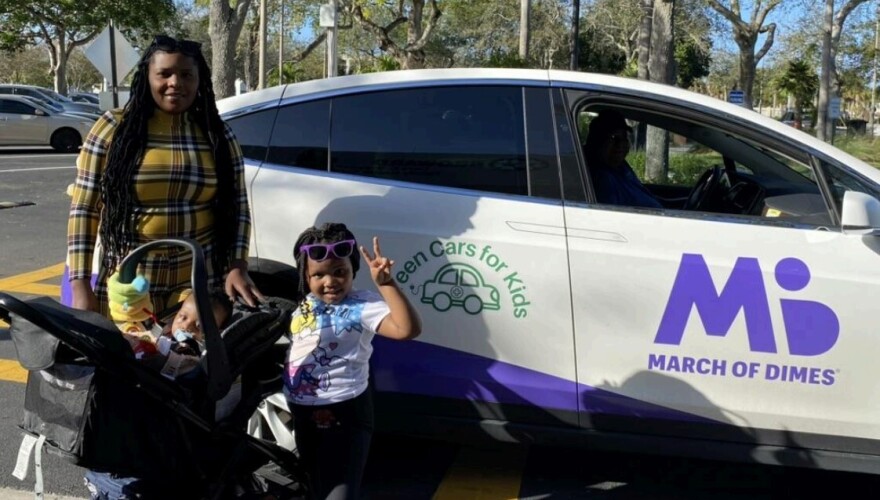This story was produced in collaboration between WUSF and Climate Central. Melba Newsome (Climate Central) contributed science reporting and Julia Elman (Climate Central) contributed data reporting.
Christina Duarte, 43, is cheerful with long brown hair. She’s glowing at more than six months pregnant with her eighth child.
"I have had four during the summertime… I don't know if it's my age or this heat, but it has never felt this hot to me," she said.
Duarte has lived in Florida her whole life. She's from Miami, but moved to Lakeland about five years ago.
Many cities across the state faced above average maximum temperatures this July — consistent with a decades-long increase influenced by the heat-trapping effects of atmospheric pollution.

For example, Lakeland where Duarte lives, experienced its third warmest July at more than 85 degrees Fahrenheit on average, which is a couple degrees more than usual, according to the National Weather Service.
On July 27, Tampa broke a record of 100 degrees. And the week between July 28 and August 5, Tampa averaged 92.4 degrees, which was 4.6 degrees warmer than normal. The same week, Lakeland, New Port Richey, St. Petersburg, Sarasota, West Palm Beach, and Miami were all warmer than usual.
The extreme heat that week across a swath of the Southeast affecting tens of millions of people was made three times more likely by climate change, according to Climate Central's CSI forensics tool.

Heat is the leading cause of weather-related deaths in the United States, according to the NWS.
And pregnant people are some of the most vulnerable to the extreme heat, much like Florida experienced this summer.
Duarte shares what it feels like to be pregnant in this heat:

"One of the first things I start feeling besides sweat, is fatigue... heart palpitations," she said.
And when she's dehydrated, she feels cramps.
"Because your uterus is a muscle like any other so it'll cramp up, just like you would get a leg cramp," Duarte said.
This cramping can sometimes be false labor contractions known as Braxton Hicks. It can even lead to pre-term labor.
The climate change of it all
A Climate Central analysis shows from 2020 to 2024, human-caused climate change at least doubled the average number of days so hot they were associated with increased risk of preterm births across 222 countries.
The U.S. had findings similar to the global analysis.
“Pregnancy heat-risk days” represent the hottest 5% of days within any area.
For the five-year period referenced above, there were 28 extremely hot and risky days for pregnant people in Florida – 19 of which were attributable to global warming.
Tampa experienced 29 extremely hot days – 20 of which were also attributable to climate change.
It's not just temperature that matters. The effects of climate change drive up humidity, making it feel even hotter for those forced to spend time outside.
"And it carries additional risk,” said Bruce Bekkar, a former obstetrician in California, and a current climate health expert.
ALSO READ: Climate change made Florida's heat wave five times more likely, experts say
During his nearly 30 years delivering babies, he said it was well-known dehydration and heat are risks to pregnancy. Although, he said he wasn’t paying attention back then to whether or not any changes took place over time.
“But it's certainly a very, very common thing before, and probably more common now, for women to come into the hospital prior to their due date, having contractions and threatening to deliver early on days that are particularly warm,” Bekkar said.

Something really shifted for him in 2015 when he read a medical study on how climate change negatively affects children's health.
"That woke a lot of us up, and I started thinking, we have to look and see whether or not this is affecting pregnancy and births,” he said.
Bekkar later took part in publishing a peer-reviewed article in 2020 on the birth impacts of a warming planet.
"Pointing to a very, very clear association between heat and a couple of types of air pollution that are linked to the burning of fossil fuels and climate change and pre-term birth, low birth weight and stillbirth,” he said.
Since its publication, that article has gathered nearly 500 citations and more than 100,000 views.
Climate Central asked Bekkar to review research which found climate change nearly doubled the number of days across the U.S. each summer when extreme heat put pregnant people and their unborn children at risk.

Bekkar agreed with the report’s findings, including its conclusion that two-thirds of the dangerously hot days in Florida in recent years were linked to climate change.
“The take home is to not think about this necessarily, just as a big picture problem, but to remember the impact on individuals, because it can be lifelong,” he said.
Lifelong issues following premature births include risk of death within the first year, and serious neurological and respiratory problems in the first five years.
And Bekkar added there's evidence preemie babies can develop serious illnesses in adulthood, like heart disease.
The most at-risk within an already vulnerable population
Although all pregnant people and their babies are vulnerable to the heat, there's a portion within this population who are even more at risk: the ones who can't escape the heat.
Take outdoor workers.
The U.S. Environmental Protection Agency reported on its website that from 1992 to 2022, a total of 986 workers in the U.S. died from heat exposure, with an average of 34 deaths per year.

Just last year, Florida’s legislature and governor banned local governments from setting heat protections for outdoor workers.
Internist and co-founder of Florida Clinicians for Climate Action (FCCA) Cheryl Holder calls the law “very unfortunate” since many employers are not knowledgeable about doing what’s right for their workers.
“These [local] regulations help bring everybody up to the right amount of knowledge and the right amount of protection,” said Holder. “It's not the fault of anyone. It's just how humans were made, and so we do have to build in these protections so humans can survive.”
But the U.S. Occupational and Safety Health Administration is currently looking into potential standards for workplaces.

Guadalupe Lamas carried her first two children to term while picking produce in the fields.
"When we were working... pregnancy was not an excuse,” she said.
Lamas is now a women's health nurse practitioner in Plant City treating many migrant farmworkers. She said it's hard and uncomfortable to work outside while pregnant, but "you just accept it."
"When I was doing it, I didn't know I could do something else. But then I had a sixth-grade education, so that's what you did,” Lamas said.
Another high-risk group is pregnant pedestrians.
Christ-Ann Magloire is an OBGYN for people in underserved communities within North Miami Beach, North Miami, and Miami Gardens.
Many of her patients walk to their doctor's appointments, or wait at bus stops in the heat. And some can’t even cool off at home.
"In these areas you have women who are living in homes that lack air conditioning... There may be a system, but it may not be working, and the cost of the repairs are very high... so they might go and say, 'You know what is more important right now, me getting food on the table or getting to work, or me just being cool,’” Magloire said.
Research shows the inability to cool down overnight poses a great risk to mother and baby.
When temperatures remain at or above 75 degrees Fahrenheit overnight, there is a 4% increase in preterm births — babies born before 37 weeks, instead of the full-term gestation of at least 39 weeks — in the days that follow, according to research conducted by the Heat Policy Innovation Hub.
When those temperatures are at or above 80 degrees, the preterm birth risk increases by 7% to 8%.
The most common heat symptoms Magloire observes in her patients are lower abdominal pressure, back pain and, like Christina Duarte experienced, cramping.

She recommends drinking lots of water – hydration is key. If you walk outside, take breaks and try to stay off your feet.
Magloire said we need a different approach to climate health action because she thinks the government isn’t doing its part.
"You have so many of these wonderful [artificial intelligence] entrepreneurs and people in finance. Maybe we need to start approaching them and asking them to start creating foundations that are going to be targeting maternity care,” she said. “I don't know, but something has to change."
ALSO READ: How Floridians, especially more vulnerable outdoor workers, can stay healthy during a heat wave
As temperatures continue to rise, Magloire would like to see public health initiatives like cooling centers, heat action plans, and better access to healthcare.
Magloire is on the board of a South Florida nonprofit called Green Cars for Kids, which helps children and pregnant people get to and from their health care visits with electric cars.
Training doulas to spot the heat risks
Another Florida nonprofit is taking the lead in protecting pregnant people from extreme heat by educating doulas on the health risks of exposure.
Doulas are nonmedical supporters for pregnant people who guide them during pregnancy and labor. Their services are covered by some insurers, including Medicaid.
Florida doulas often connect to their clients through the state’s free Healthy Start program, which has local chapters.
Through a CDC Foundation grant, Florida Clinicians for Climate Action is currently piloting a project in South Florida to train doulas how to identify whether or not a pregnant person is prepared to deal with extreme weather.
“We put these tools together, and we trained the doulas in understanding how climate change occurred, why pregnant women are at risk, and how they can work to find out more,” said Cheryl Holder of FCCA.
When you think you've had enough to drink, drink some more. I constantly have ice and cups of fluids in my car… Should you feel like you're not taking in enough water or fluids? IV fluids - just always clear it with your doctor.Christina Duarte
“And then we provide resources for that pregnant person. We even have dollars in our grant, that, if they need it, cooling, because they don't have AC at home.”
The organization is temporarily offering portable air conditioning systems to those most in need.
Elizabeth Veras is a doula in Fort Lauderdale who’s taken the FCCA training and is currently implementing it into her routine with clients.
She’s worked in maternal health in various capacities over the years, but she still learned new information through this education program.
“Underserved communities, women of color have higher risk for pre-gestational diabetes, high blood pressure, and even pre-term labor. And all of that kind of climbs monumentally when you take into account heat… So, that was more shocking than even surprising, because we live in South Florida, and heat is such a part of our lives,” Veras said.
“Giving them the tools for staying cool, the importance of staying hydrated, being able to make a disaster preparedness plan - that kind of eases a lot of that burden that also affects their mental health,” she said.

Christina Duarte, the expecting mother of eight from Lakeland, is actually a doula herself.
She offers some advice to Floridians who are pregnant along with her during this heat wave, like let your car’s AC cool the vehicle down before you drive.
“When you think you've had enough to drink, drink some more,” she said. “I constantly have ice and cups of fluids in my car… Should you feel like you're not taking in enough water or fluids? IV fluids - just always clear it with your doctor.”
Duarte said as long as her children are young, she doesn’t plan to leave Florida, despite the heat.
“Because I've lived in Florida my whole life… you kind of learn to adapt and just accommodate… and turn up the AC,” she said.





